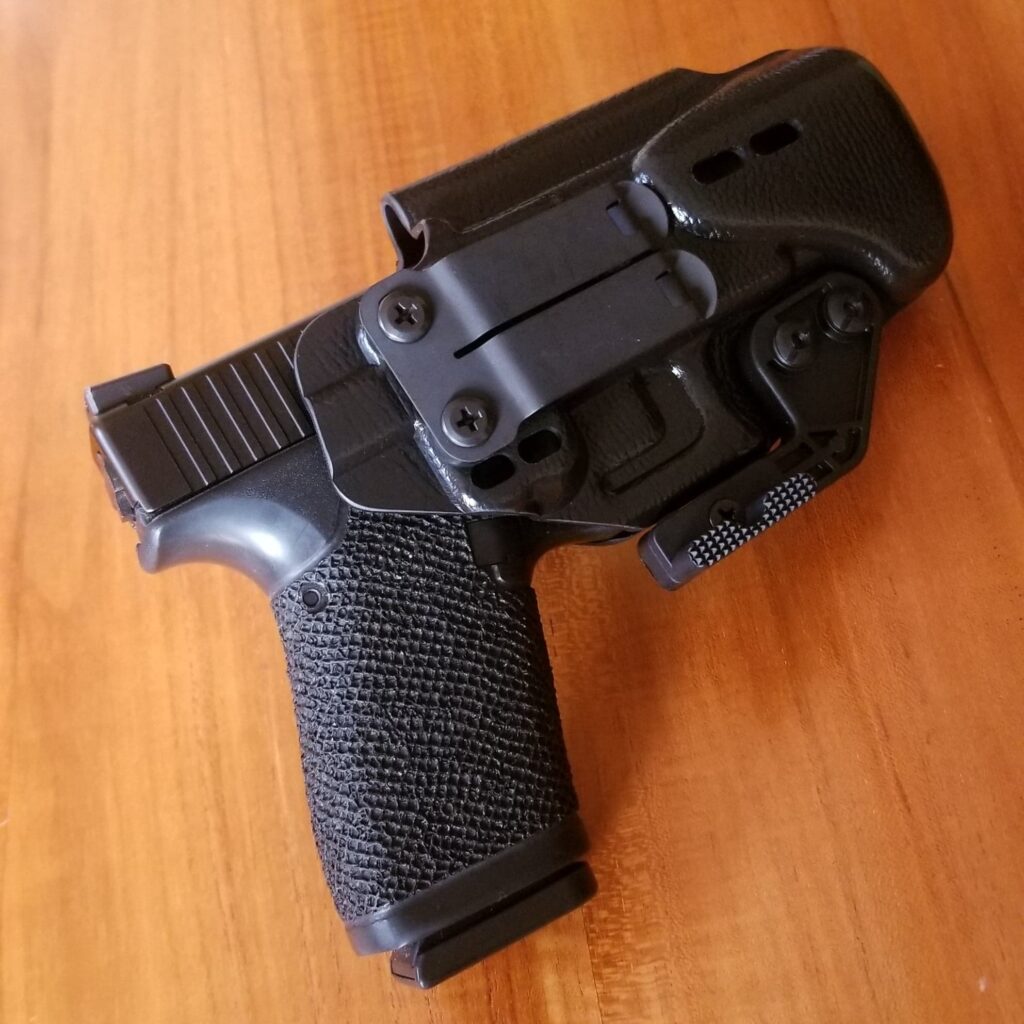
A common reaction to a woman in physical danger is that she should have a gun.
After all, it’s the great equalizer, the tool that allows a smaller, weaker victim fight off a bigger, stronger attacker. It doesn’t require a lot of strength to use, and it’s relatively accessible and not terribly difficult to learn.
I agree in part. Guns are extremely powerful and create options that no other self-defense weapon can. I carry one myself. In fact, this is my Boresight Solutions Glock 19 in PHLster Pro holster with Discreet Carry Concepts monoblock clip (some of which I paid full price for, some of which was given to me).
But here’s a secret: I don’t carry it all the time. That’s because there are a lot of reasons why guns aren’t the one-size-fits-all answer to women’s personal protection problems.
The right to possess and carry firearms isn’t universal. A woman may be barred by finances, by age, by geography, and by other factors from owning a gun and having it with her at all times. In those circumstances, then what? It’s important to be well-versed in other safety strategies for those times instead of relying on the gun.
Even when you can carry a gun, you might choose not to…and that’s okay. Concealment isn’t always easy or practical, and you might not have the right gun or gear to support having a firearm with you at all times. Carrying dangerously isn’t always a wise decision, nor is carrying when the law allows you but not a work or venue rule. We can talk big games about being judged by twelve instead of carried by six, and about being better to have than not need rather than need and not have, but real life interferes. The downsides of carrying can legitimately outweigh the statistically unlikely chance you’ll actually need your gun.
Say a woman has her gun with her when she is attacked. It’s not a magic talisman that will keep her safe all by itself. She needs to be able to actually access the firearm, get it out, and shoot it effectively to stop the threat…all while ensuring that she is using that lethal force justifiably under the law. Even under the most ideal self-defense circumstances, that can be a difficult proposition. Enjoying some relaxing practice at the range is one thing. Exercising those same skills under stress is entirely different. The ability to draw and shoot quickly and accurately without endangering innocent bystanders is trainable, and life-threatening stress can be simulated, but it’s not generally something that will come naturally to a shooter.
Using a gun defensively is made even more challenging when the attacker is close enough to prevent her from reaching her gun or to attempt to wrestle it from her. Training is an obvious solution, but the physical skills necessary to successfully meet these types of attacks can require a significant time and energy commitment. She might have learned the techniques in an evening or weekend seminar, but they may fail her without regular practice and testing against resisting opponents. And if they fail, the consequences can be dire, especially if she has no backup plan.
Then there’s that moment of deciding to actually shoot, to potentially end another human being’s life. Even aside from the legalities of whether it is appropriate to use a deadly weapon against a threat, the realization that you might actually kill someone dead with that gun of yours can be sobering, even scary. The best time to figure that out is before your muzzle is pointed at a person but either way, you might decide you can’t actually press that trigger and send a bullet into living flesh. There’s no shame in that. It simply is. If it is, then a gun isn’t for you and all of the people in the world saying you should carry a gun to protect yourself won’t change that. You might change your mind later, but that’s up to you and only you and until then, you shouldn’t rely on carrying a gun or even pointing it at a bad guy to protect yourself.
Finally, even after getting through all of those hurdles and having a successful defensive shooting that stops the bad guy and leaves you alive and safe from their attacks, there are still consequences that you might not be willing to face. You might be legally and morally in the right. You might not have hurt anybody who didn’t deserve to be hurt. You might still end up in jail and in court defending your righteousness. That costs time and money, and goes with the personal cost of using a gun and possibly killing someone no matter how necessary it was to save your life. Deciding beforehand that you are okay with someone dying because you defended yourself doesn’t always insulate you from suffering emotionally afterward anyway. Your family, friends, neighbors, and coworkers might decide they’re not okay with it regardless, and you and your loved ones may pay the price both economically and socially. Knowing all of that in advance might mean that you don’t want to use a gun for self-defense whether in a particular situation or at all.
I’m not saying don’t carry a gun. But don’t feel forced to because it keeps getting presented as the simple answer to all dangers. And realize that if you choose to, you need to realize that they are only a single part of a complete personal safety plan. There are no “just” answers in self-defense, and saying “just” get a gun is one of the worst expressions of that idea.




